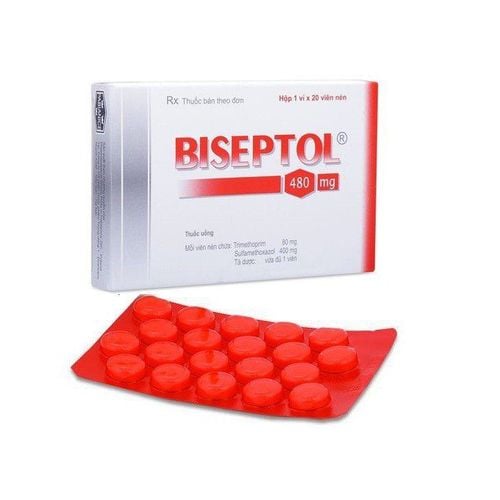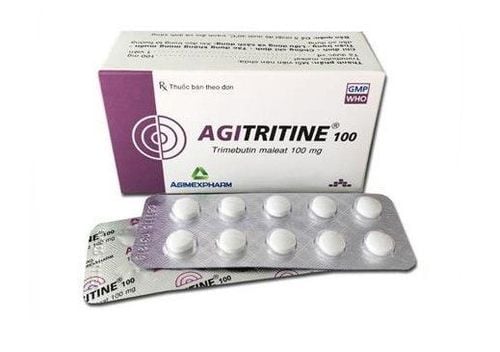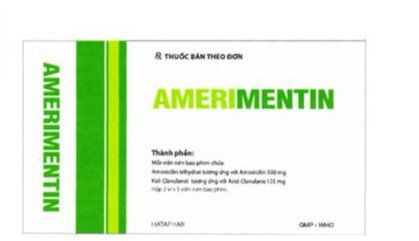This is an automatically translated article.
Bronast medicine 20mg contains the active ingredient esomeprazole magnesium trihydrate, which is used to treat gastritis, oesophagitis or other symptoms related to the digestive tract. So what does Bronast do?1. Uses of Bronast
What is Bronast? Bronast medicine contains the active ingredient esomeprazole magnesium trihydrate equivalent to esomeprazole 20mg, which is used in the treatment of gastritis, esophagitis and other symptoms related to the gastrointestinal tract. Bronast medicine works quickly to relieve symptoms encountered, ensuring the health of the digestive system.Indications to use Bronast drug for the following cases:
For adults: Gastroesophageal reflux disease. Treatment of esophagitis caused by reflux. Prevention of re-infection of esophagitis. Symptomatic treatment of patients with gastroesophageal reflux disease. Combined use with antibiotics in the eradication of Helicobacter pylori. Prevention of recurrent gastric ulcers in patients infected with helicobacter pylori. For patients taking non-steroidal anti-inflammatory drugs: Prevention of ulcers in patients taking non-steroidal anti-inflammatory drugs or in patients at risk. Zollinger-Ellison syndrome and other cases accompanied by increased gastric acid secretion. Prolonged treatment after intravenous prophylaxis of peptic ulcer rebleeding has been given. In addition, some other effects of the drug are not listed on the approved drug label, but in some cases, the doctor may prescribe Bronast medicine. Therefore, before taking the medicine, consult your doctor.
2. How to use Bronast
What is Bronast used for? Bronast is available in the form of tablets. Dosage depends on the patient's age and pathology as follows:Adults and children over 12 years old in the treatment of reflux esophagitis: Take 40mg daily for 4 weeks, with An additional 4 weeks of water can be used for patients who are still injecting. Take 20mg per day for cases of drug use in the prevention of recurrence of esophagitis. In the symptomatic treatment of gastroesophageal reflux disease with a dose of 20mg per day if the patient has not had reflux esophagitis for about 4 weeks. Treatment of helicobacter pylori: Use 20mg of Esomeprazole in combination with 500mg of clarithromycin and 1gram of amoxicillin, orally twice a day for 7 days. For patients taking NSAIDs: Take 20mg daily for 4-8 weeks to treat stomach ulcers caused by the use of non-steroidal anti-inflammatory drugs. In the prevention of peptic ulcers in patients at high risk of gastrointestinal complications, but requiring continued non-steroidal anti-inflammatory drug therapy, 20 mg daily. Treatment of Zollinger Ellison syndrome: Oral Bronast with a starting dose of 40mg, twice a day. The dose will then be adjusted to each patient's response and continued treatment when clinically indicated. For patients with impaired liver function, no dose reduction is required in patients with mild to moderate hepatic impairment. Patients with severe hepatic impairment should not exceed a maximum dose of 20mg Bronast. There are no data on the use of esomeprazole in children under 12 years of age. Patients can take the drug with or without food, before or after eating. However, to reduce stomach irritation you can take it with food and need to take the whole tablet with a full glass of water. Use Bronast exactly as directed by your doctor, do not use more, smaller or longer than prescribed. Use Bronast regularly to get the most benefit from it, and you can stop taking it if any new symptoms appear or your condition does not improve after 7 days. Absolutely do not abuse the drug for too long for a long time. This does not make the patient's condition better, but also increases the risk of unwanted effects.
3. Undesirable effects when using Bronast
Bronast medicine can cause some unwanted and common side effects, such as:Nervous system disorders such as headache, patients with paresthesia, dizziness or somnolence. Gastrointestinal disorders: Constipation, diarrhea, abdominal pain, bloating or nausea, vomiting, gastrointestinal candidiasis. Metabolic and nutritional disorders such as peripheral edema. Psychiatric disorders: Insomnia, depression, confusion, agitation. Hepatobiliary disorders: Elevated liver enzymes, hepatitis with or without jaundice. Skin and Subcutaneous Tissue Disorders: Dermatitis, rash, pruritus, urticaria, baldness, photosensitivity. Musculoskeletal and connective tissue disorders: Fractures of hip, spine and wrist, myalgia, arthralgia. Blood and lymphatic system disorders: Thrombocytopenia, leukopenia. Immune system disorders: Hypersensitivity reactions such as angioedema, fever, anaphylactic reactions or anaphylaxis. Eye disorders: Blurred vision. Ear disorders and labyrinth. Respiratory, thoracic and mediastinal disorders such as bronchospasm. Renal and urinary disorders: Interstitial nephritis, in some patients accompanied by renal failure. General and local disturbances such as increased sweating, malaise. Rare conditions, such as leukopenia, pancytopenia, and severe hypomagnesaemia, may be associated with hypocalcemia or may also lead to hypokalemia, liver failure, and encephalopathy in the patient. had liver disease, temper, hallucinations, erythema multiforme, toxic epidermal necrolysis, Stevens - Johnson syndrome, muscle weakness, gynecomastia, microscopic colitis,.... Before prescribing prescription, doctors always consider the benefits and effectiveness of Bronast drugs. When using Bronast, unwanted effects may still occur. Therefore, when unusual symptoms appear, especially when a severe allergic reaction occurs with accompanying signs such as severe dizziness, difficulty breathing, rash, swelling or itching of the face or neck area throat, tongue,... In this case, the patient should immediately notify the doctor or nurse for immediate medical intervention.
4. Some notes when using Bronast
Some notes when using Bronast include:Report a history of allergies to Bronast, hypersensitivity reactions to or any other allergies. Bronast may contain inactive ingredients and could cause an allergic reaction or other serious problems. Report any medications you are taking including prescription and nonprescription drugs, herbs and supplements, foods, dyes or preservatives. Bronast is contraindicated in patients with a history of hypersensitivity to any of its components such as esomeprazole, benzimidazoles. Concomitant use of nelfinavir and atazanavir is not recommended. In the presence of any unusual symptoms such as unintentional weight loss, recurrent vomiting, dysphagia, melena, or suspected gastric ulceration, malignancy should be excluded, because treatment with esomeprazole may relieve symptoms and delay diagnosis. Patients on long-term treatment should be monitored regularly. Patients on an as-needed regimen should contact their treating physician when symptoms change in characterization. When prescribing Esomeprazole as an as-needed regimen, consideration should be given to interactions with other drugs because plasma concentrations of esomeprazole may vary. Patients with rare hereditary problems of fructose intolerance, glucose - galactose malabsorption or sucrase - isomaltase deficiency should not take Bronast. Treatment with proton pump inhibitors may slightly increase the risk of gastrointestinal infections caused by salmonella and campylobacter. Co-administration of esomeprazole with atazanavir is not recommended, if the combination of atazanavir with proton pump inhibitors is unavoidable. Bronast may reduce the absorption of vitamin B12, so it should be considered in patients with reduced vitamin B12 stores or risk factors for reduced vitamin B12 absorption during long-term therapy. Concomitant use of clopidogrel and esomeprazole is not recommended. For patients at risk for osteoporosis, care should be taken according to current clinical guidelines and appropriate amounts of vitamin D and calcium should be supplemented. For pregnant and lactating women: Currently, there are not enough clinical data on the use of Esomeprazole in pregnant women or whether it is excreted in breast milk, so before using Bronast, it is necessary to use Esomeprazole in pregnant women. Consult your doctor to weigh the benefits and risks. If you forget to take a dose of Bronast, take it as soon as possible. However, if it is close to the time of your next dose, skip the missed dose and continue taking or injecting the medicine as scheduled. Do not use more drug than prescribed treatment. Bronast overdose or ingestion can cause serious symptoms such as nausea, vomiting, abdominal pain, shortness of breath, fainting,...
5. Drug interactions
Drug interactions can decrease the effectiveness of Bronast, or increase the effects of unwanted effects. Tell your doctor about all other medicines you are taking including over-the-counter medicines, vitamins, prescription drugs, and herbal products. Do not start, stop or change the dose of any medicine without your doctor's consent.Some drugs that can interact with Bronast include:
Drugs that are absorbed pH dependently: Concomitant use of Bronast with atazanavir is not recommended and concomitant use of Bronast with nelfinavir is contraindicated. Drugs that are metabolized concurrently with nelfinavir. Drugs that metabolize CYP2C19: Patients should be monitored when initiating and stopping concomitant treatment with Bronast with warfarin or other coumarin derivatives because the drug may cause a clinically significant increase in INR. Bronast had no clinically significant effect on the pharmacokinetics of amoxicillin or quinidine. Bronast increases the serum concentration of tacrolimus. Concomitant use of Bronast and clopidogrel is not recommended.
6. How to store Bronast
Store Bronast at room temperature below 30 degrees Celsius, protected from light and away from moisture. Do not store Bronast in a humid place or in the freezer and keep it away from heat and open flames. Different medicines will have different storage methods, so read Bronast storage instructions carefully on the packaging, or ask your pharmacist. Keep Bronast out of the reach of children and household pets. When the medicine has expired or is damaged and cannot be used anymore, dispose of it and dispose of it properly. Bronast should not be disposed of in an environment such as a plumbing or toilet unless requested to do so. Consult with your waste disposal company or pharmacist for advice on how to safely dispose of Bronast to help protect the environment.In summary, Bronast medicine contains the active ingredient esomeprazole magnesium trihydrate equivalent to esomeprazole 20mg, which is used in the treatment of gastritis, oesophagitis and other symptoms related to the gastrointestinal tract. Bronast medicine works quickly to relieve symptoms encountered, ensuring the health of the digestive system. However, Bronast can cause some unwanted effects and drug interactions, so tell your doctor what medicines you are taking to reduce the risk of unwanted effects and at the same time increase effective for treatment.
Please dial HOTLINE for more information or register for an appointment HERE. Download MyVinmec app to make appointments faster and to manage your bookings easily.













